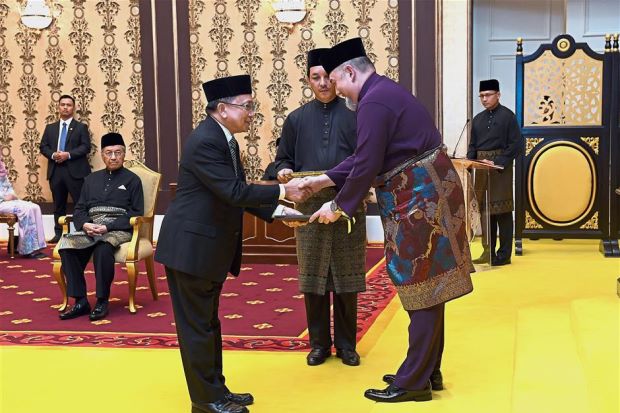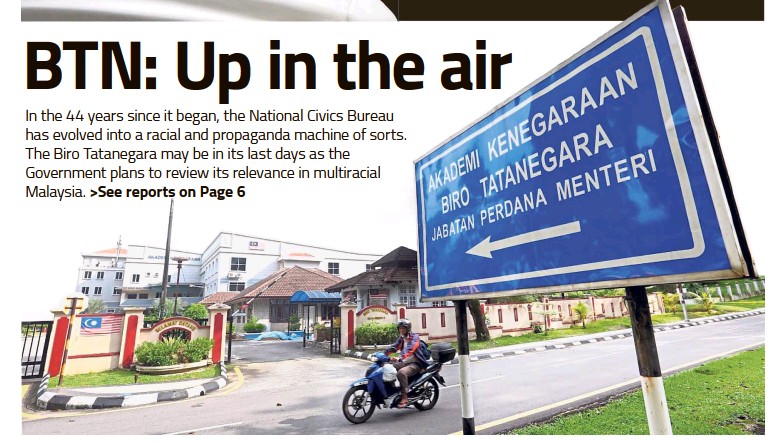 |
It’s official: The Yang di-Pertuan Agong
Sultan Muhammad V presenting the letter of appointment to Malanjum at
Istana Negara. Looking on is Prime Minister Tun Dr Mahathir Mohamad. —
Bernama
|
IT’S a fairy tale come true for some Malaysians banking on a better Judiciary grounded on merits when news of Tan Sri Richard Malanjum having been sworn in as the ninth Chief Justice of Malaysia started to trickle down to the media late Wednesday evening.
Just several hours before that, the witty Malanjum had brushed off talk of him being selected as the next top judge.
“Itu cerita dongeng (It’s a fairy tale),” he told reporters in Kuching before walking off quickly.
But by then there were already some pictures of him attending an alleged rehearsal session being circulated among a few privileged ones.
Well, going by some of the not-so-welcoming responses from those who thought that the position was reserved for only Malay judges, the initial hush-hush circumstances were understandable.
But we cannot really fault those who think the positions are reserved purely for Malays. If you have only been exposed to Chief Justices (CJ, top post) and Chief Judges of Malaya (CJM, top three) after 1994, then you might be forgiven for thinking that the posts are for Malaysians of Malay origin only (see lists of LPs and CJs).
In the last two decades, top posts had been taken by Malay judges but if we look further back, the situation was much different prior to 1994. There used to be a good mix of judges from different races at least for the CJM post, which was then known as the Chief Justice of Malaya (a No.2 post then and not to be confused with the current CJ post, which is a top post). The top judge was known as the Lord President (LP) then or Lord President of the Supreme Court in full.
The LP position was created after the abolition of appeals to the Judicial Committee of the Privy Council in 1985.
Below the LP were the Chief Justices of the High Courts of Malaya and Borneo.
In 1994, the LP was renamed CJ when the Supreme Court reverted to the name of Federal Court, which was the name used prior to 1985 but with the Privy Council as the highest authority.
In 1994, Parliament amended the Federal Constitution and approved a reorganisation of the court system and significantly set up the Court of Appeal as the second highest court and renamed the highest court Federal Court (previously Supreme Court). After 1994, there was a new No.2 position created called the President of the Court of Appeal. The CJM hence moved to the third position.
For senior lawyer Datuk Roger Tan, judicial diversity is an essential element.
“It is pivotal in creating confidence in a multi-racial society. Diversity can be on the grounds of race, religion and gender.
“In Britain, they just had the first female President of the Supreme Court in hundreds of years,” said Tan.
Lawyer Fahri Azzat said there is nothing in the Constitution that demands that a Chief Justice, President of the Court of Appeal or the Chief Judge of Malaya must be of Malay heritage, or dictates that the racial composition of the Federal Court or even the Court of Appeal contain a majority of citizens of Malay heritage.
In fact, Article 123 of the Federal Constitution which deals with the qualifications to be a High Court judge and above provides the following:
A person is qualified for appointment und
er Article 122B as a judge of the Federal Court, as a judge of the Court of Appeal or as a judge of any of the High Courts if – (a) he is a citizen; and
(b) for the 10 years preceding his appointment he has been an advocate of those courts or any of them or a member of the judicial and legal service of the Federation or of the legal service of a State, or sometimes one and sometimes another.
For Fahri, that a persistent racial pattern at the appellate courts continues in the Judiciary suggests that race is a more influential factor than abilities or merits when it comes to the appointment and promotion of a judge.
Fahri even wrote about it in 2010 on the LoyarBurok website about the racial composition of the Judiciary.
“Any litigator who is in the thick of litigation practice in our civil courts will acknowledge that at the level of top senior counsel, the composition is the opposite of the nation’s racial population.
“Where top senior legal counsel are concerned, the ratio of Malaysians of Indian heritage are highest as compared to those of Chinese heritage who come in second as compared to those of Malay heritage who have the lowest numbers. That is how I know it to be from experience and conversation,” Fahri wrote then.
However, on Malanjum’s appointment, Fahri has this to say: “I think it is a step or start in the right direction. Whether it closes the gap in terms of judicial diversity and meritocracy remains to be seen with subsequent appointments of both the top judges and the High Court judges.
“I think it will be the starting point for the public to renew its faith in the Judiciary but that again remains to be seen from their judgments, judicial statements and the Judiciary’s actions collectively.
“Just as a swallow does not a summer make, a few judicial appointments do not guarantee rejuvenation of the Judiciary,” he said, adding that these positive developments if seen through over the long term will help foster faith and trust in the Judiciary and the administration of the justice system as a whole.
Retired Federal Court judge Datuk Seri Gopal Sri Ram said the appointment is definitely a welcome move and expected to improve the Judiciary.
“This is the first time we have a non-Malay being made a top judge. Prior to this we had non-Malay judges being appointed to the second highest positions. But that was before 1994.
“From the time of independence until then, no one had looked at the appointments on racial or religious angle. Only in recent times did people start to do so.”
He named a few prominent top judges then such as Tan Sri H.T. Ong, Tan Sri S.S. Gill and Tan Sri Gunn Chit Tuan.
“Richard’s appointment verifies the oneness of Malaysia. That there is only one Malaysia. That there is no East Malaysia or a West Malaysia,” said Sri Ram.
Sultan of Perak Sultan Nazrin Shah had in his special address at the book launch of Tun Arifin Zakaria last year mentioned a valuable quote by his father Sultan Azlan Shah, who was also a respectable Lord President.
“I quote, ‘The rules concerning the independence of the judiciary ... are designed to guarantee that they will be free from extraneous pressures and independent of all authority, save that of the law. They are, therefore, essential for the preservation of the Rule of Law,” he said.
The Sultan hit the nail on the head. Justice and judges should be free from any extraneous pressures and everything has to be based on the merits of the law.
The Ruler had on the same occasion called on Federal Court and Court of Appeal judges to write dissenting judgments if they do not agree with the majority of the Bench.
“Sometimes, the brave dissenting voice is transformed into law. A classic case is that of Brown v. Board of Education 347 US 483 (1954) when the US Supreme Court gave weight to the spirit of Justice Harlan’s dissenting voice in Plessy v. Ferguson 163 US 537 (1896).
“As a result, and in a historic judgment, then-chief justice Warren held that racial segregation in public schools constituted a violation of the US constitutional guarantee of equality of rights,” he said.
The Sultan added that judges should be free to express reasons in their judgments as they thought fit, and in other words, for the Rule of Law to flourish, courts and their participants should be allowed to express a variety of ideas and principles.
In the case of Malanjum, some critics even brought up the point that he was not qualified to be made the Chief Justice because of his dissenting judgments in the case of Lina Joy and the use of the Allah word in the Bible.
In Lina Joy, she lost a six-year battle in 2007 to have the word Islam removed from her identity card after the Federal Court dismissed her appeal in a majority decision.
In his dissenting judgment, Malanjum said the department responsible for issuing identity cards should have just complied with Lina Joy’s request to remove the word from her IC. He accused the National Registration Department of abusing its powers.
“In my view, this is tantamount to unequal treatment under the law. She is entitled to an IC where the word Islam does not appear,” Malanjum said.
In the second case, the Federal Court was divided again with Malanjum dissenting and arguing that the Constitution must remain the supreme law of the land.
In his column, constitutional law expert Prof Dr Shad Saleem Faruqi had also written about Malanjum’s boldness in voicing out his stand and daring to dissent.
According to Dr Shad, in PP v Kok Wah Kuan in 2008, the Federal Court had in a majority judgment “mocked the doctrine of separation of powers as having no legal basis” in the Constitution.
The judgment went further to say that the power of the courts was limited to whatever Parliament bequeathed.
“Fortunately, there was a bold dissent from Malanjum, our Sabah and Sarawak Chief Judge, who insisted that separation of powers and judicial independence are firm pillars of our constitutional edifice.
“He rejected the view that ‘our courts have now become servile agents of a federal Act of Parliament and that the courts are now only to perform mechanically any command or bidding of a federal law’.
“Justice Malanjum was eminently correct on both scores. A Constitution is not mere words written on paper,” Dr Shad wrote in his column.
These words by the eminent professor were enough to back Malanjum as a strong guardian of the rule of law and is definitely fitting for the grand position of a Chief Justice.
Enough said, time will tell if we have taken the right path.
Related story:
Malanjum wants regular meetings with the Bar
Related Posts











































